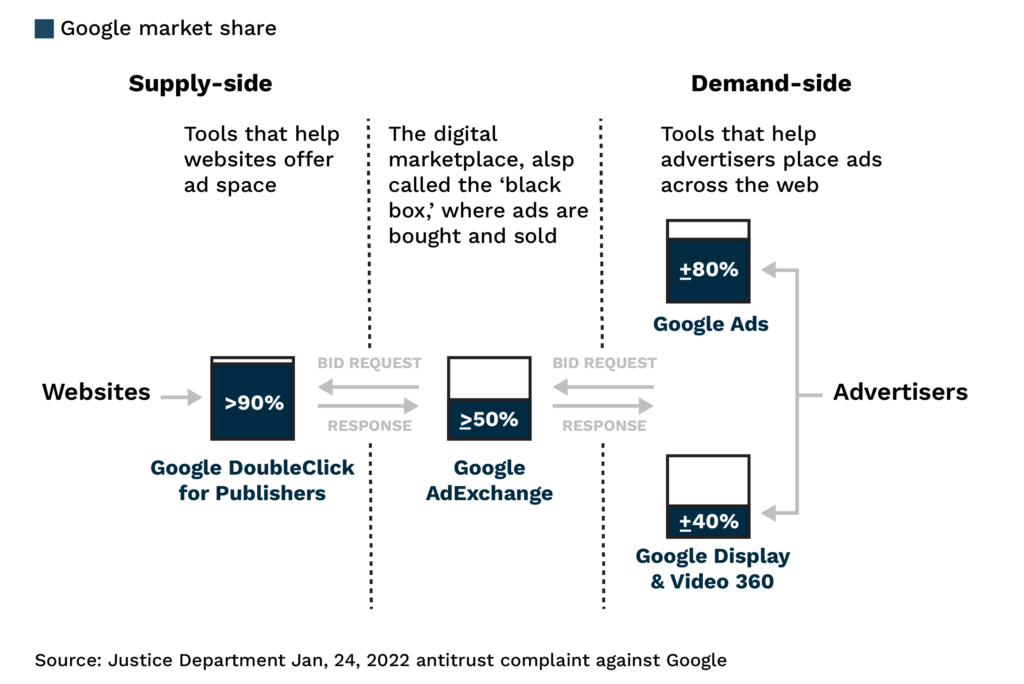Google's Dominance In Online Advertising Challenged By U.S. Action

Table of Contents
The Antitrust Concerns Fueling U.S. Action Against Google
The U.S. government's actions against Google stem from serious antitrust concerns regarding its dominance in the digital advertising market. These concerns center on allegations of anti-competitive behavior, market manipulation, and the exploitation of its market power.
- Specific Allegations: The lawsuits allege Google engaged in practices designed to stifle competition, including favoring its own products in search results, using its market power to manipulate auction systems for advertising space, and entering into exclusive deals that limit opportunities for rivals. These actions, according to the government, have artificially inflated Google's market share and suppressed innovation.
- Legal Basis: The U.S. government's action is rooted in the Sherman Antitrust Act and other competition laws designed to prevent monopolies and foster a fair and competitive marketplace. The legislation aims to ensure consumers benefit from a diverse range of choices and competitive pricing.
- Potential Penalties: If found guilty, Google faces substantial penalties, including hefty fines, structural changes to its business model, and potential divestiture of certain assets. The outcome of these lawsuits could significantly reshape Google's advertising business and its overall corporate structure.
- Impact on Stock Price and Investor Confidence: The ongoing antitrust lawsuits have already impacted Google's stock price and investor confidence. Uncertainty surrounding the outcome of the legal battles creates volatility in the market, highlighting the significance of these challenges to Google's financial stability and future growth.
The Impact on Advertisers and the Broader Digital Advertising Ecosystem
The increased scrutiny of Google's advertising practices is likely to have a ripple effect throughout the digital advertising ecosystem. Changes in the competitive landscape will impact advertisers, both big and small.
- Advertising Costs: Increased competition could lead to lower advertising costs for businesses, especially as alternative advertising solutions gain traction. However, the initial impact might be unpredictable, with potential short-term fluctuations before a new equilibrium is reached.
- New Advertising Platforms and Technologies: The challenge to Google's dominance is likely to foster innovation and the emergence of new advertising platforms and technologies. This increased competition can lead to improved functionalities, more transparent pricing models, and a wider array of options for advertisers.
- Impact on SMBs: Small and medium-sized businesses (SMBs) often rely heavily on Google Ads for their online marketing. Increased competition could present both opportunities and challenges, allowing them to explore alternative solutions and potentially access more affordable advertising options.
- Increased Transparency and Fairer Competition: Ultimately, the outcome of these legal battles could lead to increased transparency and fairer competition within the advertising market, benefiting advertisers and consumers alike.
Potential Alternatives to Google Ads Gaining Traction
Advertisers are increasingly exploring alternatives to Google Ads, recognizing the risks associated with over-reliance on a single platform. Several competitors are gaining momentum.
- Key Competitors: Meta (Facebook/Instagram) ads and Microsoft Advertising are two prominent examples of alternatives to Google Ads. Each offers distinct features and target audiences, providing advertisers with opportunities to diversify their strategies.
- Platform Comparison: Meta ads excel in social media targeting, while Microsoft Advertising offers strong integration with the Bing search engine, creating potential reach outside of the Google ecosystem. Each has unique advantages depending on the specific campaign goals.
- Potential for Growth: The increased scrutiny of Google's practices provides a window of opportunity for these alternative platforms to expand their market share. They can capitalize on the uncertainty and concerns among advertisers.
- Diversifying Advertising Strategies: Advertisers are now more likely to adopt diversified strategies, allocating budget across multiple platforms to reduce dependence on Google and improve resilience.
The Rise of Programmatic Advertising and its Role in Challenging Google's Dominance
Programmatic advertising, which uses automation to buy and sell digital ad space, plays a significant role in challenging Google's dominance.
- Basics of Programmatic Advertising: This technology uses algorithms and real-time bidding (RTB) on ad exchanges to automate the process of purchasing and delivering ads across various websites and platforms.
- Diversifying Ad Spend: Programmatic advertising allows advertisers to reach wider audiences and access inventory beyond Google's network, reducing their dependence on a single player.
- Eroding Google's Dominance: By offering transparency and efficiency, programmatic advertising empowers advertisers to access a broader range of options and potentially negotiate better pricing, thus eroding Google's control over the market.
Conclusion
The U.S. government's action against Google's dominance in online advertising marks a significant turning point. The potential outcomes include increased competition, potentially lower advertising costs for some, and a more diverse digital advertising ecosystem. While the full ramifications remain to be seen, the challenges to Google's dominance represent a substantial shift with far-reaching implications for businesses and consumers alike.
Call to Action: Stay informed about the evolving landscape of Google advertising and its competitors. Explore alternative advertising strategies to mitigate risks and optimize your online marketing efforts. Understanding the changing dynamics of the online advertising market is crucial for future success.

Featured Posts
-
 Can Bakole Shock Parker A Heavyweight Bout Breakdown
May 04, 2025
Can Bakole Shock Parker A Heavyweight Bout Breakdown
May 04, 2025 -
 Chris Fallica Condemns Trumps Apparent Submission To Putin
May 04, 2025
Chris Fallica Condemns Trumps Apparent Submission To Putin
May 04, 2025 -
 Ufc Bogeymans Seven Fight Run A Controversial Knockout
May 04, 2025
Ufc Bogeymans Seven Fight Run A Controversial Knockout
May 04, 2025 -
 Parker Bakole Clash Interim Wbo Championship On The Line
May 04, 2025
Parker Bakole Clash Interim Wbo Championship On The Line
May 04, 2025 -
 Kivinin Kabugu Yenir Mi Faydalari Riskleri Ve Dikkat Edilmesi Gerekenler
May 04, 2025
Kivinin Kabugu Yenir Mi Faydalari Riskleri Ve Dikkat Edilmesi Gerekenler
May 04, 2025
